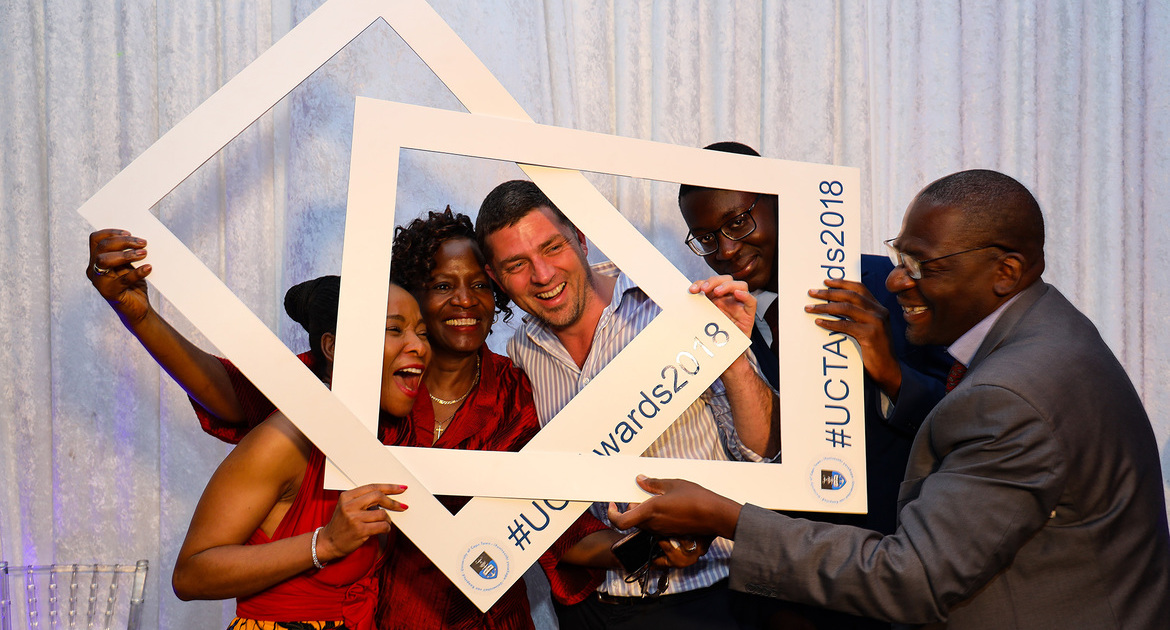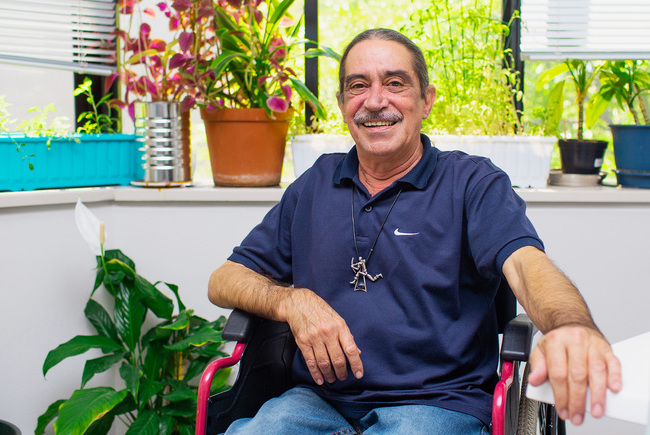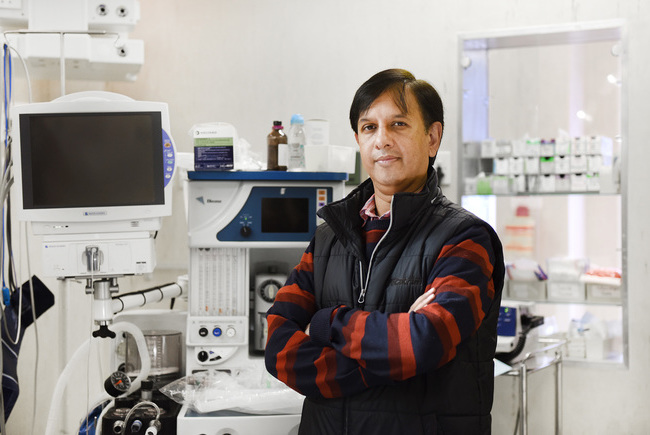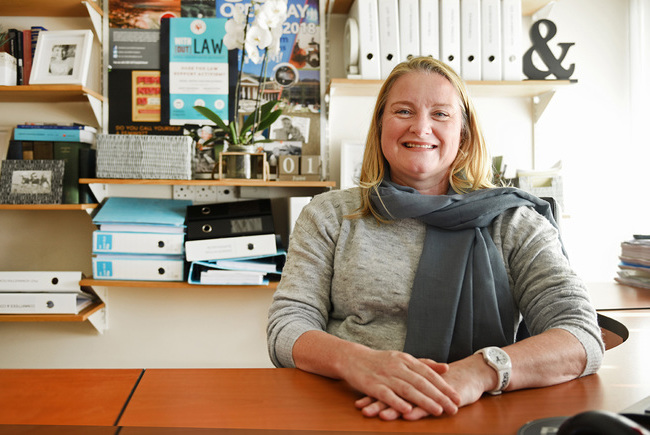Heather Zar: improving and saving lives
26 June 2018 | Story Nadia Krige. Photo Michael Hammond. Read time 8 min.
UCT’s Professor Heather Zar has been named recipient of the 2017 Alan Pifer Award – a prestigious prize presented annually by UCT’s vice-chancellor in recognition of outstanding socially responsive research.
Zar, a paediatrician and scientist, has gained a reputation for rising above the challenges posed by a lack of resources to create new strategies to address key childhood illnesses. Over the past 20 years, she has helped improve and save the lives of thousands of children through research and innovation in child health.
It is therefore fitting that she has been recognised with this award, which underpins the UCT’s commitment to producing a body of work that contributes to the advancement of South Africa’s disadvantaged people.
“It’s a wonderful acknowledgement of the work being done by my teams and with many collaborators,” says Zar, who is chair of the Department of Paediatrics & Child Health at the Red Cross War Memorial Children’s Hospital and director of the South African Medical Research Council’s Child and Adolescent Lung Health Unit.
“One of the contributions one wants to make as an academic is helping to improve the lives of people who need it most.”
The 2017 Alan Pifer Award also comes hot on the heels of two other prestigious honours for Zar: being named the 2018 L’Oreal-UNESCO Women in Science Laureate for Africa and the Arab States and receiving the World Lung Health Award from the American Thoracic Society.
Innovation – where it’s needed most
As a paediatric pulmonologist working in South Africa, Zar has focused on the key illnesses that cause death among children – pneumonia, tuberculosis (TB) and asthma. Although these diseases are treatable, lack of knowledge, underdiagnosis and insufficient medical resources pose a challenge throughout Africa.
Childhood pneumonia causes around one million deaths each year, according to global estimates. This burden is disproportionately high in sub-Saharan Africa where pneumonia is the commonest cause of illness, hospitalisation and mortality in children.
The rate of TB infection on the African continent is among the highest in the world. In South Africa, childhood TB makes up about 20% of all cases. Recent estimates of TB prevalence in Cape Town show that 511 of 100 000 cases are children under the age of five years.
Asthma affects between 10 and 20% of children, and studies by Zar and her team show that one in five adolescents in Cape Town is affected.
A practical and cost-effective approach
The challenges of childhood respiratory conditions in low-income communities in South Africa may seem insurmountable, but Zar is combatting them with cutting-edge science. She has been at the helm of developing accessible and cost-effective innovations by applying high-level science to these conditions common in resource-limited settings.
These include developing better strategies to diagnose TB and pneumonia in children from spit, mucus and nasal swabs, and applying sophisticated molecular tests for accurate diagnosis. This work has changed the approach to diagnosing childhood TB globally and has been integrated into World Health Organization guidelines. She has also demonstrated that preventative use of a common antibiotic for treating TB reduced by 50% mortality in HIV-infected children who were not on antiretroviral medication.
In the area of childhood pneumonia, her studies have included defining factors that influence the burden and risk of infection, and improving diagnosis. These have contributed to better preventive and treatment options.
Where the treatment of asthma is concerned, Zar is known for developing and rolling out an easy-to-use spacer made from a plastic bottle to help deliver medication. Zar and her team showed that this homemade device is an excellent alternative to more expensive, commercial devices.
“This has had a large impact on improving care of children with asthma in resource-constrained settings,” writes Dean of the Faculty of Health Sciences Prof Bongani Mayosi in his motivation letter for Zar’s Alan Pifer nomination. “It provides a way to deliver inhaled therapy to children anywhere.”
Drakenstein Child Health Study
One of Zar’s recent projects is the Drakenstein Child Health Study, which will follow the lives of 1 000 mother–child pairs living in low-income communities on the outskirts of Paarl. Through this study, Zar and her team aim to investigate the early life determinants of child health and causes of illness. They will focus on risk factors in seven areas that may influence child health and development: environmental, infectious, nutritional, genetic, psychosocial, maternal and immunological.
Mothers are enrolled while they are pregnant and are followed through pregnancy and childbirth. Once the child is born, the study follows the pair for at least five years.
The study has already yielded important new information on the causes of childhood illness and offered opportunities for prevention and treatment strategies.
Fostering leaders in child health
Underpinning Zar’s research and innovation, is a strong commitment to capacity building and developing the next generation of African leaders in child health. She has trained several clinical scientists from a range of backgrounds and mentored many postgraduate students and other healthcare professionals from South Africa, Kenya, Uganda, Nigeria, Ghana and Malawi. As president of the Pan African Thoracic Society, she has been able to lead global advocacy efforts to improve lung health for all.
Inherent to this capacity development has been the growth of clinical research sites and infrastructure. In addition to the Drakenstein Child Health Study, Zar hasestablished research sites in Khayelitsha and the Eastern Cape, as well as the Research Centre for Adolescent and Child Health and the Medical Research Council Unit on Child and Adolescent Health at Red Cross Children’s Hospital.
When asked what her advice would be to young researchers looking to follow in her footsteps, Zar says, “Find something that you’re passionate about and pursue it. Work in a team – collaboration is key – and find a good mentor.
“Finally, believe in yourself and strive hard for those goals that may not seem so easy to attain.”
 This work is licensed under a Creative Commons Attribution-NoDerivatives 4.0 International License.
This work is licensed under a Creative Commons Attribution-NoDerivatives 4.0 International License.
Please view the republishing articles page for more information.
UCT Annual Awards
A total 134 long-serving staff were honoured at the 2018 University of Cape Town (UCT) Annual Awards on 19 November, an event at which Vice-Chancellor Professor Mamokgethi Phakeng also congratulated recipients of ad hom promotions, the Distinguished Teacher Award and the Alan Pifer Award.
Distinguished Teacher Award
Alan Pifer Award

















